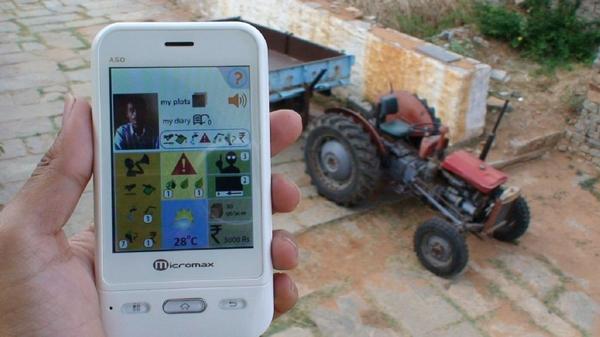An app to re-empower farmers

© Farmbook
A cell phone application enables Indian farmers to better negotiate the sale of their harvests. Farmbook is designed for use by this population segment, where illiteracy is very common.
What is the current market price of rice or peanuts? Is now the right time to buy fertilizer or pesticides? These are some of the crucial questions that Indian farmers ask themselves. However, many of these farmers cannot read or write. With their cell phone, however, they can connect to one another and exchange this information. This is the wager being made by the application FarmBook, which uses icons and a text-to-speech system.
Using pictograms to communicate
Farmers trust their experience in the field as well as that of their fellow farmers. "Contrary to what one might expect given the illiteracy rates, many farmers actually own a cell phone. It is a good start to sharing information. However, farmers needed an application designed for their specific needs", explains Hendrik Knoche from the EPFL's Media and Design Laboratory

FarmBook works with Android based smart phone models that are accessible in terms of price. The application is intended to facilitate the real-time transmission of their advice and tips. To accomplish this, the application relies on a system of invitations, text-to-speech and a series of pictograms that enable illiterate people to locate and share information.
Negotiating from a position of strength
Farmbook provides essential data that farmers need in order to properly organize themselves like the weather forecast. However, the application offers much more than this. Users on the network can share information almost in social network-like fashion. If diseases affect crops in a neighboring region, for example, farmers can anticipate the possible need for treatment.
Finally, farmers can also monitor food prices on the market. Knowing what margin farmers can demand for the fruit of their labor is crucial. "Sharing this information places them in a position of strength during negotiations!", adds Oscar Bolaños, a student at the EPFL's School of Computer and Communication Sciences, who is also involved in this project.
In a small village called C.K.Pura, a three-hour drive from Bangalore, 15 farmers, half of whom are illiterate, are currently testing the application. For the moment, the audio feedback system works better than the pictograms, which will be redesigned to make them easier to visually comprehend. Initial tests also revealed that farmers feel more confident using FarmBook when audio prompts accompany the actions for each of the interface items.
The project is being conducted in partnership with the Indian Institute of Science in Bangalore, Department of Electronic Systems Engineering. It is sponsored by the Swiss Agency for Development and Cooperation.
---
Participants in the FarmBook project:
Hendrik Knoche and Professor Jeffrey Huang from the EPFL's Media and Design Laboratory
Oscar Bolaños, student at the EPFL's School of Computer and Communication Sciences
HS Jamadagni, TV Prabhakar, Andre Pittet, Akshay Uttama and Prakruthi Keshavamurthy from the Indian Institute of Science in Bangalore, Department of Electronic Systems Engineering
Nitish Meena, Reecha Bharali and Priyamvada Tiwari, design students from IIT Guwahati